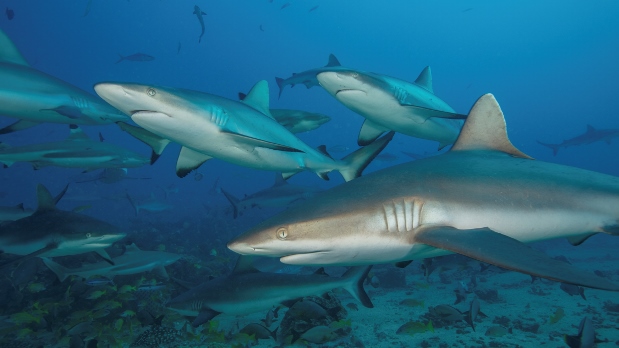The fossil record of sharks (members of the subclass Elasmobranchii within the class Chondrichthyes, or cartilaginous fishes) dates back more than 420 million years. Over the course of this time, sharks have been among the top predators found in the world's oceans and have been crucial to the natural order of marine ecosystems. Significantly, sharks survived the major mass-extinction episodes over the past 400 million years, including the Cretaceous–Paleogene extinction event (66 million years ago), which was precipitated by an asteroid impact that subsequently led to the extinction of 75% of the Earth's species, including all nonavian dinosaurs. Recently, however, a team of paleontologists discovered a previously unknown extinction event that occurred 19 million years ago in the early Miocene Epoch and decimated ancient sharks, reducing shark abundance by 90% and shark biodiversity by 70%. See also: Chondrichthyes; Elasmobranchii; Extinction; Marine ecology; Mass extinctions; Miocene; Paleobiodiversity; Paleontology; Selachii; Shark history

The researchers discovered this previously unknown shark extinction event by analyzing sedimentary microfossils called ichthyoliths, which include shark dermal denticles (scales) and bony teeth that naturally fell from the bodies of ancient sharks to the seafloor. Shark scales and teeth are made of a mineralized material (bioapatite) that preserves well in the fossil record. In contrast, the cartilaginous skeletons of sharks are too soft to fossilize. The microfossils were retrieved from deep-sea sediment drill cores from multiple regions in the open sea. The research team noted a dramatic reduction in the numbers of shark microfossils appearing in the sediment cores approximately 19 million years ago. This reduction was more than 90% in comparison to the numbers of shark scales and teeth found prior to the early Miocene. In addition, the accumulation rates and abundances of various morphotypes (shapes) of shark scales—which indicate the presence of different species—also dropped significantly (more than 70%), suggesting that many species went extinct about 19 million years ago. Microfossil analyses of more recent sediments indicate that sharks never recovered to their former abundances and suggest that the diversity of modern-day sharks represents only a fraction of that found prior to the early Miocene. See also: Fossil; Marine sediment; Micropaleontology; Scale (zoology); Tooth
The cause or causes of the shark extinction event that occurred 19 million years ago remain obscure. The massive die-off of such great numbers of sharks in the early Miocene is notable because it occurred independently of any recognized global climate episode or other mass extinction. Although the exact factors responsible for the early Miocene decimation of sharks are undetermined thus far, intense and rapid environmental pressures must have been involved. Similar intense and rapid environmental pressures are also affecting present-day sharks, although the declines in modern shark biodiversity are being driven predominantly by human-caused factors—in particular, ocean warming and overfishing. Conservationists hope to obtain insights from the past history of shark populations—especially insights pertaining to the rapid decline of shark biodiversity in the early Miocene—that may provide opportunities for improved methods and approaches for shark preservation and restoration. See also: Anthropocene extinction; Conservation of species; Fisheries ecology; Marine conservation; Ocean warming





